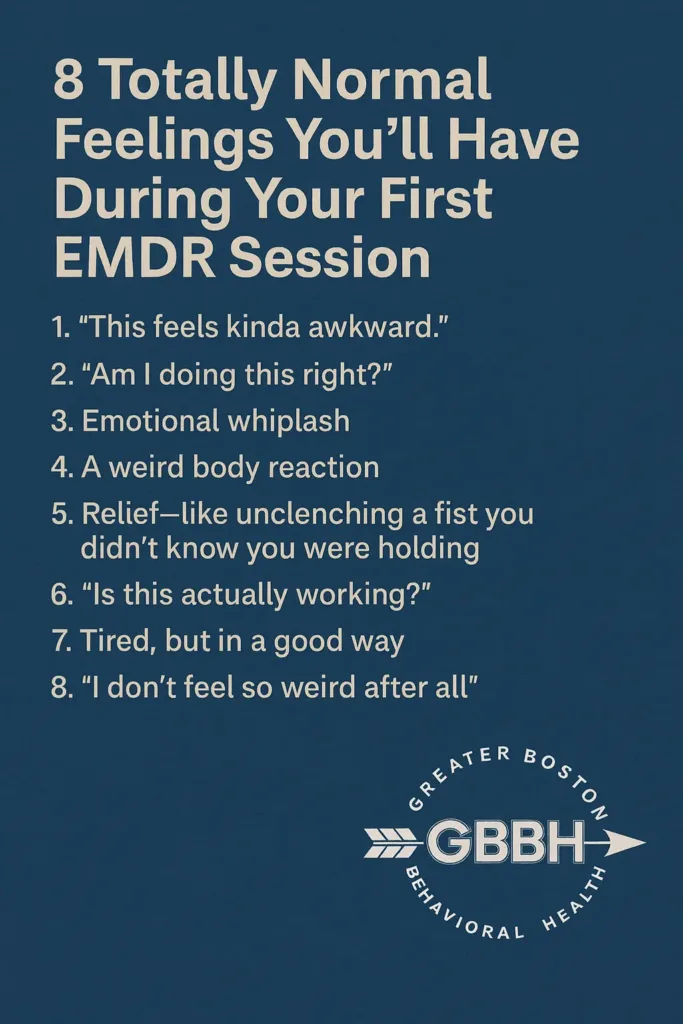You walk into the room. It’s quiet. Comfortable, but strange. You’re not sure whether to sit like you’re at a job interview or just flop onto the couch. Your therapist explains how EMDR therapy works—something about eye movements and “reprocessing.” Part of you wants to bolt. The other part—the one that’s tired of carrying it all—decides to stay.
If you’re young and sober, EMDR can feel like stepping into a totally different world. No numbing, no distractions, no substances to buffer the hard stuff. Just you and your brain…finally facing it. Here’s what you might feel—and why every one of those feelings is 100% valid.
1. “This feels kinda awkward.”
You’re watching someone move their fingers in front of your face while thinking about stuff you usually avoid. It’s weird. Even the therapist knows it’s weird.
But EMDR isn’t trying to impress anyone—it’s trying to help your brain stop treating old memories like current emergencies. The awkwardness means you’re doing something new, something vulnerable. And guess what? That’s where growth hides.
“I spent the first ten minutes wondering if I was supposed to cry or something. Turns out, just showing up was enough that day.” – Young adult client, 2023
2. “Am I doing this right?”
Everyone thinks this during their first session. EMDR can feel abstract—like emotional improv with no clear rules. Your brain jumps around. Some thoughts feel totally unrelated. But all of that is part of how trauma heals.
You don’t have to force anything. Your therapist is there to guide the process. Trust that your brain knows what it needs, even if it doesn’t look polished or dramatic.
3. Emotional whiplash
EMDR stirs things up. You might laugh unexpectedly, then tear up five seconds later. A smell might bring back a memory from age 10 you forgot existed.
One client put it like this: “It felt like flipping through my mental photo album—but the pages were out of order and some were on fire.”
That’s the point. EMDR helps your brain re-file those memories in a safer way—so they stop hijacking your emotions when you least expect it.
4. A weird body reaction
Tingling. Tension. Shaky hands. Random tears. Some people feel a heavy chest, others feel like they’re floating. Your body stores trauma—even if your brain tries to outthink it.
These sensations aren’t random; they’re signs that your system is releasing stuff you’ve been holding onto. Your job? Notice it. Breathe through it. Let it move.
If you’re worried about how your body might react, your therapist will slow things down and keep you grounded. You’re never alone in the process.
5. Relief—like unclenching a fist you didn’t know you were holding
Sometimes, after just one session, you’ll walk out feeling a little lighter. Not fixed. Not euphoric. Just…less clenched. Like your brain exhaled for the first time in a while.
One young client described it as, “like I cracked open a window in a room I didn’t realize was suffocating me.” That’s what EMDR can do. It won’t erase everything in one go—but it lets light in.
6. “Is this actually working?”
This thought is a classic. EMDR doesn’t always feel linear. You might expect a movie montage of catharsis—but instead get a quiet sense of “huh, that’s weird” as something inside shifts.
The results often show up later:
- You don’t flinch at that song anymore.
- That person’s name doesn’t cause a mental spiral.
- You sleep through the night without the dream.
Healing isn’t always loud. Sometimes it’s just the absence of panic.
7. Tired, but in a good way
EMDR can leave you feeling emotionally wrung out—in a strangely satisfying way. Think: post-cry nap vibes. Your brain just did deep, internal work. That’s exhausting.
It’s okay to go home, order takeout, and do nothing for the rest of the day. Recovery isn’t just about doing the work—it’s about letting yourself rest afterward.
8. “I don’t feel so weird after all.”
This might sneak up on you after a few sessions. The thoughts you were scared to say out loud? Someone else has had them too. The pain you thought made you broken? Turns out it’s more common than you realized.
In places like Boston, Dedham, and all over Massachusetts, people are healing with EMDR. You’re not the “weird one.” You’re the brave one.
FAQs About EMDR Therapy for Young Adults
What is EMDR therapy, exactly?
EMDR (Eye Movement Desensitization and Reprocessing) is a therapy designed to help people process and release trauma. It uses bilateral stimulation (like eye movements) to help your brain rewire how it stores painful memories.
Is EMDR just for trauma?
Not at all. While EMDR is best known for treating PTSD, it also helps with anxiety, panic attacks, self-esteem issues, and even grief. If your brain is stuck on something, EMDR might help.
What if I don’t want to talk about everything?
That’s okay. EMDR isn’t like traditional talk therapy. You don’t have to explain every detail of your past out loud. Your therapist guides you without forcing you to relive things verbally.
Can I do EMDR if I’m newly sober?
Yes, and it can be especially helpful. Trauma and emotional wounds often surface once substances are gone. EMDR can help you deal with that emotional backlog without becoming overwhelmed.
Will I cry during EMDR?
Maybe. Maybe not. Some people cry. Some people laugh. Some people feel numb. All responses are valid. Your therapist will help you stay grounded no matter what comes up.
Let’s Be Real: This Is Brave
Choosing EMDR therapy while young and sober is a bold move. It means facing the stuff you used to avoid. It means learning to trust your mind—and your therapist—again.
Whether you’re coming from Boston, Dedham, Needham, or somewhere nearby, we’re here to help you do that work safely, supportively, and without judgment.
Call (888) 450-3097 or learn more about EMDR Therapy at Greater Boston Behavioral Health.
Your brain isn’t broken. It’s just asking for help to heal. Let’s do that together.


